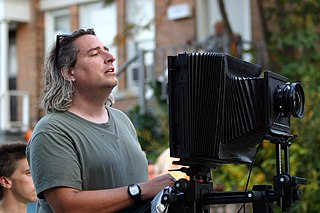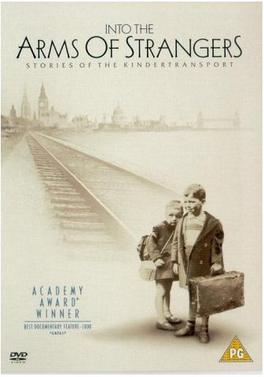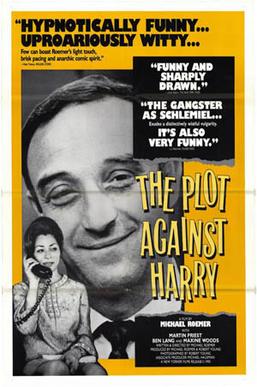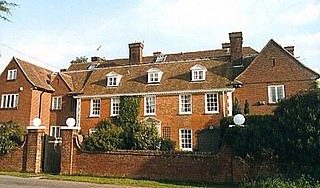Related Research Articles

Nothing but a Man is a 1964 American independent drama film starring Ivan Dixon and Abbey Lincoln, and directed by Michael Roemer, who also co-wrote the film with Robert M. Young. The film tells the story of Duff Anderson, an African-American railroad worker in the early 1960s who tries to maintain his dignity in a small racist town near Birmingham, Alabama, after he marries the local preacher's daughter. In addition to dealing with oppression and discrimination, Anderson must also come to terms with his troubled relationship with his own father, a drunk who abandoned and rejected him.

Isaac Liev Schreiber is an American actor, director, screenwriter, producer, and narrator. He became known during the late 1990s and early 2000s after appearing in several independent films, and later mainstream Hollywood films, including the first three Scream horror films (1996–2000), Ransom (1996), Phantoms (1998), The Hurricane (1999), Kate & Leopold (2001), The Sum of All Fears (2002), The Manchurian Candidate (2004), The Omen (2006), Defiance (2008), X-Men Origins: Wolverine (2009), Taking Woodstock (2009), Salt (2010), Goon (2011), Pawn Sacrifice (2014), Spotlight (2015), The 5th Wave (2016), and The French Dispatch (2021). He has also lent his voice to animated films such as My Little Pony: The Movie (2017), Isle of Dogs, and Spider-Man: Into the Spider-Verse.

Gregory Crewdson is an American photographer. He photographs tableaux of American homes and neighborhoods.

Michael Joseph Connelly is an American author of detective novels and other crime fiction, notably those featuring LAPD Detective Hieronymus "Harry" Bosch and criminal defense attorney Mickey Haller. Connelly is the bestselling author of 31 novels and one work of non-fiction, with over 74 million copies of his books sold worldwide and translated into 40 languages. His first novel, The Black Echo, won the Mystery Writers of America Edgar Award for Best First Novel in 1992. In 2002, Clint Eastwood directed and starred in the movie adaptation of Connelly's 1997 novel, Blood Work. In March 2011, the movie adaptation of Connelly's novel The Lincoln Lawyer starred Matthew McConaughey as Mickey Haller. Connelly was the President of the Mystery Writers of America from 2003 to 2004.

The Kindertransport was an organised rescue effort of children from Nazi-controlled territory that took place in 1938–1939 during the nine months prior to the outbreak of the Second World War. The United Kingdom took in nearly 10,000 children, most of them Jewish, from Germany, Austria, Czechoslovakia, Poland, and the Free City of Danzig. The children were placed in British foster homes, hostels, schools, and farms. Often they were the only members of their families who survived the Holocaust. The programme was supported, publicised, and encouraged by the British government, which waived the visa immigration requirements that were not within the ability of the British Jewish community to fulfil. The British government placed no numerical limit on the programme; it was the start of the Second World War that brought it to an end, by which time about 10,000 kindertransport children had been brought to the country.

John Kirkham Hubley was an American animated film director, art director, producer, and writer known for his work with the United Productions of America (UPA) and his own independent studio, Storyboard, Inc.. A pioneer and innovator in the American animation industry, Hubley pushed for more visually and emotionally complex films than those being produced by contemporaries like the Walt Disney Company and Warner Brothers Animation. He and his second wife, Faith Hubley, who he worked alongside from 1953 onward, were nominated for seven Academy Awards, winning three.

Sir Nicholas George Winton was a British stockbroker and humanitarian who helped to rescue Jewish children who were at risk of being murdered by Nazi Germany during the Holocaust. Born to German-Jewish parents who had emigrated to Britain at the beginning of the 20th century, Winton assisted in the rescue of 669 children, most of them Jewish, from Czechoslovakia on the eve of World War II. On a brief visit to Czechoslovakia, he helped compile a list of children needing rescue and, returning to Britain, he worked to fulfill the legal requirements of bringing the children to Britain and finding homes and sponsors for them. This operation was later known as the Czech Kindertransport.

Lan Samantha Chang is an American writer of novels and short stories. She is the author of The Family Chao and Hunger. For her fiction, which explores Chinese American experiences, she is a recipient of the Anisfield-Wolf Book Award, the Berlin Prize, the PEN/Open Book Award and the Rona Jaffe Foundation Writers' Award.

Leighton Rhett Radford "Darcus" Howe was a British broadcaster, writer and racial justice campaigner. Originally from Trinidad, Howe arrived in England as a teenager in 1961, intending to study law and settling in London. There he joined the British Black Panthers, a group named in sympathy with the US Black Panther Party.
Henry Nemo was an American musician, songwriter, and actor in Hollywood films who had a reputation as a hipster.

Into the Arms of Strangers: Stories of the Kindertransport is a 2000 documentary film about the British rescue operation known as the Kindertransport, which saved the lives of over 10,000 Jewish and other children from Nazi Germany, Austria, Czechoslovakia, and Danzig by transporting them via train, boat, and plane to Great Britain. These children, or Kinder in German, were taken into foster homes and hostels in Britain, expecting eventually to be reunited with their parents. The majority of them never saw their families again. Written and directed by Mark Jonathan Harris, produced by Deborah Oppenheimer, narrated by Judi Dench, and made with the cooperation of the United States Holocaust Memorial Museum, it utilized rare and extensive footage, photographs, and artifacts, and is told in the words of the child survivors, rescuers, parents, and foster parents.

Kevin Gelshenen Rafferty II was an American documentary film cinematographer, director, and producer, best known for his 1982 documentary The Atomic Cafe.
Leo Braudy is University Professor and Professor of English at the University of Southern California, where he teaches 17th- and 18th-century English literature, film history and criticism, and American culture. He has previously taught at Yale, Columbia, and Johns Hopkins University. He is best known for his cultural studies scholarship on celebrity, masculinity, and film, and is frequently sought after for interviews on popular culture, Hollywood cinema, and the American zeitgeist of the 1950s.

The Plot Against Harry is an American comedy film directed by Michael Roemer. The plot involves Harry Plotnick, a small-time Jewish gangster living in a now largely Hispanic and African American New York neighborhood playing the numbers game after being released from prison.
Harvard Beats Yale 29–29 is a 2008 documentary film by Kevin Rafferty, covering the 1968 meeting between the football teams of Yale and Harvard in their storied rivalry. The game has been called "the most famous football game in Ivy League history". Actor Tommy Lee Jones, who was a 1st-team All-Ivy League guard for Harvard that season, was interviewed for the documentary.

The Bunce Court School was an independent, private boarding school in the village of Otterden, in Kent, England. It was founded in 1933 by Anna Essinger, who had previously founded a boarding school, Landschulheim Herrlingen in the south of Germany, but after the Nazi Party seized power in 1933, she began to see that the school had no future in Germany. She quietly found a new home for the school and received permission from the parents of her pupils, most of whom were Jewish, to bring them to safety in England. The new school was called New Herrlingen School, but came to be known as Bunce Court. The school closed in 1948. Alumni, who sometimes stayed on at the school even after finishing, were devoted to the school and organized reunions for 55 years. They have referred to its "immense effect" on their lives, as "Shangri-La" and to being there as "walking on holy ground".
Peter Morley, OBE was a German-born British television producer and documentary filmmaker. As a nine-year-old child, he fled Nazi Germany with his elder siblings and moved to England, where he lived until his death. He made several documentaries about the Holocaust, winning several awards, both in Britain and abroad.
Hanna Bergas was a German teacher. Fired from her job and prevented from teaching in public schools in Nazi Germany, she found employment at a private boarding school in Blaustein, in southern Germany. In 1939, after she had fled to England, Bergas was part of the group of teachers from Bunce Court School that met the Kindertransports and helped the refugee children adjust to their lives in the new country. After the war, Bergas emigrated a second time, moving to the United States.
Moira Kirland is an American television writer and producer, whose credits include Dark Angel, The Dead Zone, Castle, and Madam Secretary. She is currently serving as a writer on Quantum Leap.
References
- 1 2 3 4 5 6 7 Vicki Vasilopoulos, "New Life for a 1964 Film" The New York Times (November 14, 2004). Retrieved October 20, 2011
- 1 2 Janet Maslin, "Children Were Saved, but So Much Was Lost" The New York Times (December 2, 1998). Retrieved October 20, 2011
- ↑ John O'Mahony, "Surfaces and depths" The Guardian (September 15, 2001). Retrieved October 19, 2011
- ↑ Andrew Lambirth, "Master of accretion" [ permanent dead link ] The Spectator (January 2, 2010). Retrieved October 20, 2011
- ↑ William H. Smock, "Michael Roemer: Silhouette" The Harvard Crimson (March 4, 1965). Retrieved October 28, 2011
- ↑ "Nan Goldin & Pawel Wojtasik present: Nothing But A Man" Archived 2011-11-16 at the Wayback Machine UnionDocs (UnDo). Retrieved October 19, 2011
- 1 2 Michael Roemer bio Archived 2011-09-15 at the Wayback Machine San Francisco Jewish Film Festival. Retrieved October 28, 2011
- 1 2 Susan King, "MICHAEL ROEMER: Unraveling 'The Plot Against Harry'" Los Angeles Times (May 26, 1991). Retrieved October 19, 2011
- ↑ "Bergamo Film Meeting".
- ↑ "1971: Creative Arts - Film" John Simon Guggenheim Memorial Foundation. Retrieved October 28, 2011
- ↑ Michael Upchurch, "Michael Roemer's `Plot' Sees The Light Of Day Again" The Seattle Times (February 24, 1990). Retrieved October 19, 2011
- ↑ "Michael Roemer". IMDb. Retrieved May 29, 2022.
- ↑ Morris, Wesley (May 27, 2022). "'Vengeance Is Mine' Review: A Tangled Web of Human Impulse". The New York Times. Retrieved May 29, 2022.
- ↑ Hamrah, A.S. (May 24, 2022). "Life Is Hard: Michael Roemer on Vengeance Is Mine". Screen Slate. Retrieved May 29, 2022.
- ↑ "Vengeance is Mine". Film Forum. Retrieved March 29, 2022.